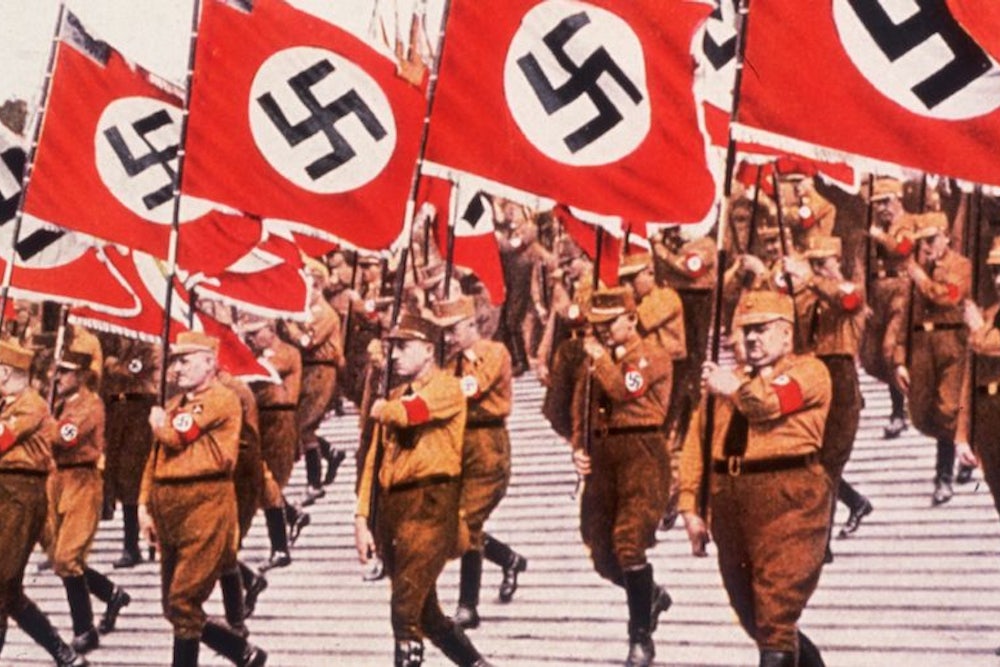Israel’s parliament is moving toward banning the use of the word “Nazi” and criminalizing comparisons of people to Nazis. Many prominent politicians, including the attorney general, oppose the bill, while its supporters argue that the Holocaust was a unique historical event and that comparisons to it cheapen it. “What I’m asking,” its sponsor told the New York Times, “is, please put away this special situation that has to do with our history.”
Is this a good bill? The short answer is easy: Of course not. Speech is good. Restricting speech is bad. Even as the National Security Agency thinks up ever more clever ways to spy on what we are saying and writing—shout-out to the folks in Fort Meade somehow reading this on my unsaved Word document!—the United States remains a global leader in upholding this truism. Israel’s approach isn’t that different from Germany’s (where the Nazi Party is banned) or France’s (where Bob Dylan was charged with allegedly insulting Croatians). The law would not be out of place in most democracies. But that doesn’t make it right.
The question of whether it is okay to call Jews or Israelis Nazis is more complicated and interesting. Nazi analogies are always fraught, their deployment frequently a sign of flailing desperation or ulterior motive on the part of the deployer; there’s a reason we have phrases like Godwin’s law (which states that Internet arguments, no matter the topic, are virtually certain to include Nazi analogies if they go on long enough) and reductio ad Hitlerum (coined, I learn from Wikipedia, by Leo Strauss!). In Israel, the comparison is problematic twice more: Because the Jews were in many ways the Nazis’ most important victims, and because the contingent circumstances of Israel’s founding cannot be understood without reference to the Holocaust.
But it seems to me that the Holocaust’s uniqueness should actually make it an extremely useful heuristic for understanding the world, even and especially in an Israeli context. We can use its special awfulness to wake up to events in our own time that might be less but still plenty awful. Reasonable adults, after all, understand that to compare someone to a Nazi—even, off-the-cuff, to call someone a Nazi—need not be an argument that the person in question is the equivalent of a Nazi. (As for unreasonable adults who do mean to argue such equivalence, they can be dismissed and disgraced. Again, see: free speech.) Similarly, reasonable Israelis might shun anti-Semites who are eager to paint the comparison while simultaneously appointing to themselves the burden not to resemble the Jews’ greatest persecutors. A healthy Israeli society would assimilate legitimate critiques and better itself.
In a 1991 New York Review of Books essay reprinted in his new book, My Promised Land (which, disclosure, my boss Franklin Foer blurbed), Israeli journalist Ari Shavit offered the following thoughts on the comparison after guarding a Palestinian internment camp in Israel-occupied Gaza:
I, too, who have always abhorred this analogy, who have always argued bitterly with anyone who so much as hints at it, I can no longer stop myself. The associations are too strong. They break through when I see a man from Pen Number 1 call through the fences to a man from Pen Number 2 to show him a picture of his daughter; or when the young man who has just been arrested awaits my orders with a mixture of surrender and panic and quiet pride. And when I merely look around at people in pens, in cages.
Like a believer whose faith is cracking, I go over and over again in my heart the long list of arguments, the list of the differences. There are no crematoria here, I remind myself, and there was no conflict between peoples there. Germany, with its racist doctrine, was organized evil, its people were not in danger, and so on.
But then I realized that the problem is not in the similarity—for no one can seriously think that there is a real similarity—but that there isn’t enough lack of similarity. The problem is that the lack of similarity isn’t strong enough to silence once and for all the evil echoes, the accusing images.
As the bill goes to a committee, Knesset members should keep Shavit’s nuanced distinction in mind: The analogy can responsibly serve to point not to the similarity, but to the troubling lack of a lack of similarity. It is telling that one prominent opponent of the bill is the director of Yad Vashem, Israel’s official Holocaust memorial and museum. Sometimes, “never forget” has to mean “never forget.”
